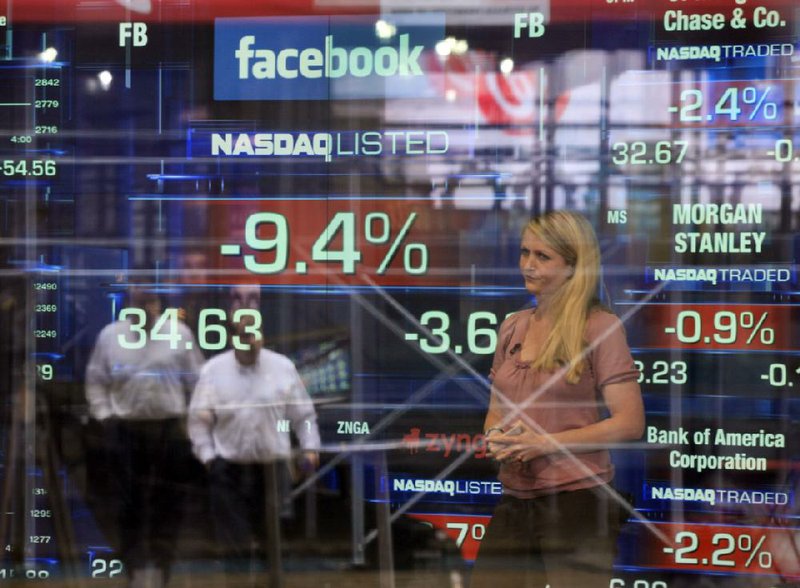SAN JOSE, Calif. — After Facebook stock narrowly stayed above the initial public offering price during its first day of trading Friday, the price fell hard and fast Monday, knocking nearly 11 percent off the company’s record-breaking initial valuation.
Facebook executed its highly anticipated IPO Thursday evening, pricing shares at $38 for total proceeds of $16 billion at a record valuation of $104 billion. Predictions of a big first-day increase in the stock price were rampant, but they fizzled Friday, as shares opened at $42 and almost immediately fell, staying below that mark for the rest of the session.
Shares finished Friday at $38.23, 0.6 percent higher than the price investors paid for IPO stock. Friday reports said the banks that underwrote Facebook’s IPO stepped in to buy stock when shares dipped near $38 on the first day of trading in order to ensure the stock closed above that level.
Without the help of the IPO underwriters, Facebook shares opened Monday at $36.53, but that price immediately dropped to below $36; in the first 30 minutes of trading, shares sold for as low as $33, a decrease of 13.7 percent from Friday’s closing price. Facebook stock closed at $34.03, more than 10 percent lower than the price investors paid for IPO shares.
Confounding those bullish on Facebook stock even more was Wall Street’s overall strength Monday: All three major U.S. stock indexes rose at least 1.1 percent, led by the tech-heavy Nasdaq composite index at 2.5 percent.
Other social-media stocks were mixed Monday after steep falls at the end of last week. LinkedIn, Yelp and Zynga all plunged for the third consecutive day early in Monday’s session, but Yelp bounced back from its lowest closing price ever with a solid gain of 3.5 percent. Mountain View, Calif.-based professional-networking site LinkedIn experienced an upand-down trading day, falling by as much as 6.8 percent and rising by as much as 1.4 percent; at the close, it had declined 2.2 percent.
Facebook partner Zynga had a horrible day Friday, when trading had to be halted twice because of sharp drops and the stock closed at alltime low of $7.16. The stock reached an all-time intraday low of $6.36 Monday morning after a sudden decrease of 11.2 percent, but the San Francisco social-gaming company’s shares bounced back to close at $7.09, a decrease of 1 percent.
Facebook was founded in a Harvard dorm room by Chief Executive Officer Mark Zuckerberg and college classmates in 2004, and has grown to 900 million users in just nine years. However, analysts and investors are concerned that its popularity may not lead to strong revenue, as the company had only $3.7 billion in sales last year and has struggled to determine how to monetize its popularity on mobile devices.
“Investors are increasingly aware of the risk embedded in the stock price. There are real concerns about growth and advertisers’ frequent lack of certainty how best to use Facebook, along with rising costs and ongoing acquisition risk,” Pivotal Research Group’s Brian Wieser told Reuters news service. Wieser has a $30 price target on the stock.
Mark Siegel, an investor with Menlo Ventures, said that Facebook’s failure to obtain a big initial pop in the stock price was a good thing for the company’s long-term goals, however.
“I’m kind of glad there wasn’t a big pop. Had this thing traded up 50 percent, it would just make the bar that much higher in terms of what the company has to deliver in revenues to avoid disappointing investors,” he said.
Wedbush analyst Michael Pachter, who came out with an “Outperform” rating on Facebook before its IPO, said he thinks the investment banks that arranged the offering overestimated demand for the company’s stock.
Last week, the bankers, led by Morgan Stanley, increased the offering price range. On Wednesday, Facebook’s early investors and other stockholders increased the number of shares they planned to sell in the IPO. Both moves appeared to signal strong demand for the shares.
“The late addition of 84 million shares to the offering overwhelmed demand, limiting the first day price,” Pachter said in a note to investors.
Information for this article was contributed by Barbara Ortutay, Pallavi Gogoi and Michelle Chapman of The Associated Press.
Business, Pages 21 on 05/22/2012
